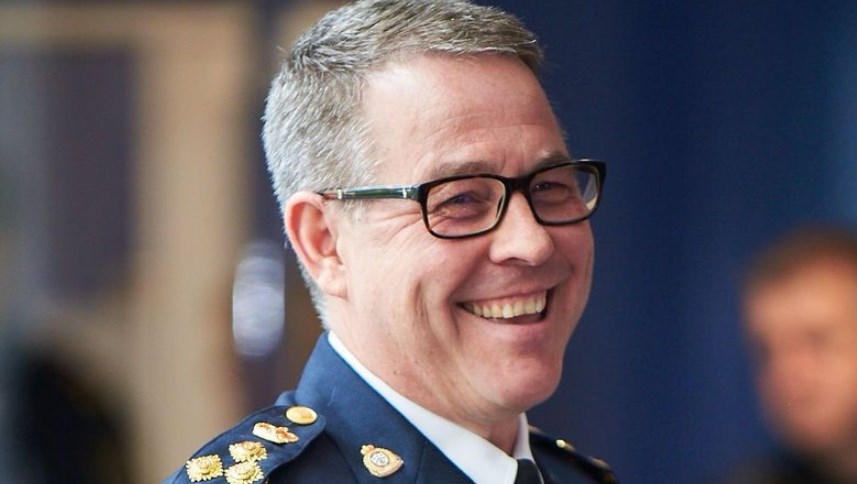Should B.C.’s police academy continue to train police recruits from the People’s Republic of China or any other states with poor human rights records?
That was the discussion at a Justice Institute of B.C. (JIBC) board meeting last Thursday, with board members deciding a proposed international education policy in relation to human rights needed more clarity, particularly as it relates to policing.
The institute’s executive was tasked with considering human rights in its international education policy in late 2019 – around the time when it was inviting hundreds of students from Chinese police colleges but concerns about China’s human rights abuses were mounting.
Member Len Goerke, the recently retired chief of the West Vancouver Police Department, told the board an international education policy on human rights requires special consideration for law enforcement courses.
“When you’re training paramedics from other countries, that’s very different, in my mind anyway, than when you’re training police officers,” he said.
Goerke said the policy proposal (which was not made public) needed stronger language to “say when we aren’t going to do something.”
Discussion circled around what constitutes human rights violations and who defines them, with members appearing to primarily accept Canada’s Charter of Rights and Freedoms, plus those codified in by the United Nations. Members discussed how a policy could act as a blueprint for assessing future decisions.
Member Connie Kaweesi, a social worker, said, “I am quite uncomfortable in offering training for policing in countries where there are significant human rights violations. Not that we do not have our own in Canada, but I don't feel that it is in JIBC’s interest to do that,” she said.
Although it wasn’t made clear that the board has permanently cut ties with China’s Public Security Bureau (the program is on pause), a House of Commons resolution this month declaring China is committing genocide against the Uyghur ethnic group should immediately guide the JIBC, said Goerke.
“I think when Parliament does something like that, [the institute] should not be engaging with that state, end of story, in terms of training their police officers.
“Because it is, in fact, the police officers in that state who are the actors in that activity that our Parliament has just condemned,” said Goerke.
Member Bernadette Spence, CEO of the Vancouver Aboriginal Child & Family Services Society, wanted to know how JIBC extended training to China in the first place.
Spence said human rights violations are a gradient and Canada commits its own, to this day, against Indigenous people.
Spence questioned the perceived harm of offering education contracts to Chinese police colleges.
“I'm also struggling with the fact that what harm is there to teach, you know, policing from the JIBC to other countries, when we strive for excellence. It's community-based policing. We're proud of our policing program. So what is the issue then? Is the issue because the country has human rights violations? It’s too diffuse for me.”
Likewise, member Maria Preovolos, a lawyer for Telus Communications, asked, “What risks are we trying to mitigate against?”
At one point JIBC President and CEO Michel Tarko, an architect of the program, told the board the program for Chinese police colleges offered “conflict resolution.” However, past photos of the classes depict use of force lessons. Tarko also suggested the recruits are merely students of a bachelor’s program and not actual officers.
Spence also raised jurisdictional matters. JIBC is run by the BC Ministry of Advanced Education, but human rights and international relations are primarily handled by the federal government, she noted.
“What is the jurisdiction of the province? Because B.C. might have a different relationship with, you know, or may have different partnerships,” she said.
And B.C. does have a unique partnership with China.
JIBC welcomed Chinese police colleges in 2014. The Advanced Education Minister then was Andrew Wilkinson. In 2016, Wilkinson signed a one-of-a-kind memorandum of understanding on China’s Belt and Road Initiative, alongside then B.C. International Trade Minister Teresa Wat, who has in the past expressed the desire for “further deepening ties with China.” The MOU called for more student exchanges.
At the meeting, member John Stubbs, a history professor, noted the JIBC program was part of the provincial strategy on international education.
“That's part of the context that we're operating in. The province has had a massive push in the last five years or more to expand international education,” he said.
Goerke noted JIBC is the only North American post-secondary institution he knows of that also operates a police academy. And police academies would not ordinarily train international recruits, he said.
Experts on policing and national security have lambasted the JIBC program, calling it an espionage risk.
Canada’s Minister of Public Safety Bill Blair has not responded to questions posed to him by Glacier Media about the program.
In 2019, the Canadian government denied visas to some of the JIBC students from China, but citing privacy reasons has not explained why.
Simon Fraser University criminologist Rob Gordon has stated the program, which generates revenue for JIBC, should be shut down.
The proposed policy is expected to return to the board at the next meeting in June.
Read more about JIBC’s international program for Chinese police colleges here.



